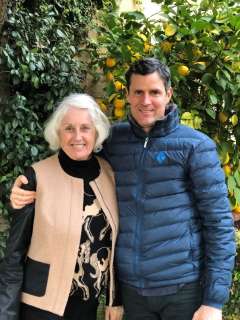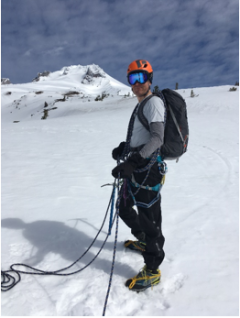$1 Million Gift Fuels the Fight Against Cancer
A Family’s $1 Million Gift Supports the Fight Against Brain Cancer

“Most glioblastoma patients face a short and hopeless future, but UCLA gave me a sense of relief.”
Jack and Joanne are no strangers to philanthropy: they have supported arts, education, legal services for the poor, minority opportunities, and women’s rights. But their gift to the UCLA Brain Tumor Center, to advance research, came from a deeply personal place.
In February 2018, their son Mac was diagnosed with stage 4 glioblastoma (GBM)--an aggressive type of cancer that can occur in the brain or spinal cord. This terrifying news sent Jack on a quest for answers that might help his son and others fight this fast moving cancer. After receiving the standard of care—surgery, followed by chemotherapy and radiation—Mac’s community of doctors at OHSU Knight Cancer Institute connected the family with the UCLA Brain Tumor Center because of the team’s cutting-edge and comprehensive approach to changing the face and fate of brain cancer. The family was introduced to Dr. Timothy Cloughesy, Director of the UCLA Neuro Oncology Program and Co-Director of the UCLA Brain Tumor Center. Together with his colleague Dr. Linda Liau, W. Eugene Stern Chair of Neurosurgery and Co-Director of UCLA Brain Tumor Center, the UCLA team is actively researching novel therapies and providing brain tumor patients with advanced, safer and more effective treatment options. Through clinical trials, the UCLA Brain Tumor Center is often one of the first programs to offer promising new treatments and technologies.
The family met with Dr. Cloughesy in October 2018 to learn more about UCLA’s approach and research, and were inspired to learn about the team’s advances in immunotherapy with their dendritic cell vaccine. A dendritic cell vaccine uses the patient’s own white blood cells to activate the immune response to fight cancer. A high percentage of patients enrolled in these trials have survived for several years, which is a much better outcome than the 15 to 17 month average life expectancy of people diagnosed with glioblastoma. Inspired by the potential life-extending outcomes for individuals diagnosed with brain cancer, the family asked Dr. Cloughesy how they could help. Dr. Cloughesy shared that in order to advance research and clinical trials, and thereby potentially extend more lives, the UCLA physician-scientists had to act fast and develop their own vaccine formula in-house at UCLA. The primary hurdle for taking these new therapies from laboratory to patients, “bench to bedside,” is adequate research funding. Impressed with UCLA’s vision and expertise, Jack and Joanne decided to gift $1 million to support the advancement of novel therapies such as the dendritic cell vaccine.
“My decision was influenced by the fact that UCLA is developing the most promising therapy available anywhere,” Jack said, “and its reliance on autologous cells and tailoring of therapy to each individual is very compelling, since each tumor is different and an individualized approach is more likely to succeed. It’s inspiring to so many people that the UCLA Brain Tumor Center is driven by the goals of advancing science and helping patients, rather than commercial considerations.”
For Mac and his parents, learning about the UCLA Brain Tumor Center’s research goals and discoveries has provided a great sense of relief and hope.

“Most glioblastoma patients face a short and hopeless future, but UCLA gave me a sense of relief,” said Mac. “When I was first diagnosed, I did not know the seriousness of this condition and its grim survival curve. The fact that UCLA’s research and innovative new therapies show promising outcomes is extremely heartening. This hope is priceless, given the fatigue of fighting cancer.”
Jack and Joanne hope that their gift will advance lifesaving research, but they also want to call attention to the unique resources available at UCLA and engender further support for the Brain Tumor Center.
“We cannot overstate the importance of community—of our friends who have done all they can to support our family during Mac’s illness, and the international network of researchers working to find a cure for glioblastoma,” said Joanne.
At the moment, Mac is doing well: he climbed Mount Hood in late April. He is cherishing his time, friends, and family more than ever.